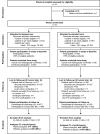Structured multi-disciplinary psychosocial care for cancer patients and the perceived quality of care from the patient perspective: a cluster-randomized trial
- PMID: 31506739
- PMCID: PMC11810274
- DOI: 10.1007/s00432-019-03018-7
Structured multi-disciplinary psychosocial care for cancer patients and the perceived quality of care from the patient perspective: a cluster-randomized trial
Abstract
Purpose: We examined whether multi-disciplinary stepped psychosocial care for cancer patients improves quality of care from the patient perspective.
Methods: In a university hospital, wards were randomly allocated to either stepped or standard care. Stepped care comprised screening for distress, consultation between doctor and patient, and the provision of psychosocial services. Quality of care was measured with the Quality of Care from the Patient Perspective questionnaire. The analysis employed mixed-effects multivariate regression, adjusting for age and gender.
Results: Thirteen wards were randomized, and 1012 patients participated (n = 570 in stepped care and n = 442 in standard care). Patients who were highly distressed at baseline had 2.3 times the odds of saying they had had the possibility to converse in private with doctors and/or psychologists/social workers when they were in stepped care compared to standard care, 1.3 times the odds of reporting having experienced shared decision-making, 1.1 times the odds of experiencing their doctors as empathic and personal, and 0.6 times the odds of experiencing the care at the ward to be patient oriented. There was no evidence for an effect of stepped care on perceived quality of care in patients with moderate or low distress.
Conclusions: Stepped care can improve some aspects of perceived quality of care in highly distressed patients.
Trial registration: http://www.clinicaltrials.gov . NCT01859429.
Keywords: Cancer; Distress; Psychosocial care; Quality of care; Randomized trial.
Conflict of interest statement
We declare that we have no conflicts of interest.
Figures
References
-
- Aiken LH, Clarke SP, Sloane DM, Sochalski J, Silber JH (2002) Hospital nurse staffing and patient mortality, nurse burnout, and job dissatisfaction. J Am Med Assoc 288:1987–1993 - PubMed
-
- Aiken LH, Sermeus W, Van den Heede K, Sloane DM, Busse R, McKee M, Bruyneel L, Rafferty AM, Griffiths P, Moreno-Casbas MT, Tishelman C, Scott A, Brzostek T, Kinnunen J, Schwendimann R, Heinen M, Zikos D, Sjetne IS, Smith HL, Kutney-Lee A (2012) Patient safety, satisfaction, and quality of hospital care: cross sectional surveys of nurses and patients in 12 countries in Europe and the United States. Br Med J 344:e1717 - PMC - PubMed
-
- Angerud KH, Boman K, Brannstrom M (2018) Areas for quality improvements in heart failure care: quality of care from the family members’ perspective. Scand J Caring Sci 32:346–353 - PubMed
-
- Arving C, Sjoden PO, Lindstrom AT, Wasteson E, Glimelius B, Brandberg Y (2006) Satisfaction, utilisation and perceived benefit of individual psychosocial support for breast cancer patients—a randomised study of nurse versus psychologist interventions. Patient Educ Couns 62:235–243 - PubMed
-
- Brintzenhofe-Szoc KM, Levin TT, Li Y, Kissane DW, Zabora JR (2009) Mixed anxiety/depression symptoms in a large cancer cohort: prevalence by cancer type. Psychosomatics 50:383–391 - PubMed
Publication types
MeSH terms
Associated data
Grants and funding
LinkOut - more resources
Full Text Sources
Medical



